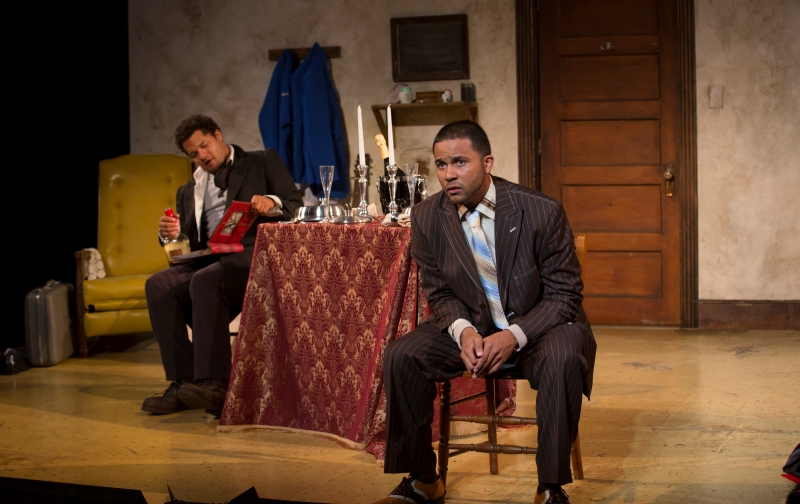

Such daring construction and dense yet rhythmic language demand swift, high-wire acting Lincoln and Booth are conning not just each other but also themselves and the audience. “There was something out there that they liked more than they liked us” is how Lincoln explains the abandonment later we understand that it applies to more than blood. And the circumstances of their youth (their parents bolted) form a rain cloud over them long before the thunder arrives. How each man fares romantically must be read between the lies. We learn that Lincoln (Corey Hawkins) was himself a card hustler only when Booth (Yahya Abdul-Mateen II) asks for advice on improving his routine. The back story arrives indirectly, and just on a need-to-know basis. The front story is clear about where it’s going, but you’re in the dark. Like three-card monte, or jazz, the play - and, at its best, Kenny Leon’s direction of it - moves too fast for analysis. Not that you can name those feelings you don’t have time.

And of course, sleight of hand: Before a minute goes by, Parks has her fingerprints all over your feelings. The endlessly sorrowful loop of American violence. There’s fraternal competition, as old and awful as Jacob and Esau. Rejecting fixed meanings, as well as the limitations and clichés of correctness, she generates themes that her play will not so much corral as set free. How wonderful to experience again, in the hilarious, harrowing and superbly acted Broadway revival that opened on Thursday at the Golden Theater, Parks’s fearlessness. (“I stole and I stole generously,” he crows.) They are bonded by familiarity, mistrust and, as their names suggest, a history beyond their own. The spieler is his brother, Booth, whose vocation seems to be shoplifting. Though this Lincoln, like the one he’s named for, wears the requisite frock coat and stovepipe hat, we see at once that he’s a Black man in whiteface, and soon learn that he earns $314 a week for letting customers at an arcade pretend to shoot him. Her skittering silverfish of a play, a Pulitzer Prize winner in 2002, glints with meaning that refuses to stay put. In a seedy rooming house apartment, as one man rehearses his three-card monte spiel - “watch me close, watch me close now” - Abraham Lincoln arrives with Chinese takeout.īut watch Parks, too. Among the most thrilling and jarring gambits in modern theater, up there with the nattering woman half-buried in sand at the top of Beckett’s “Happy Days,” is the scene that opens Suzan-Lori Parks’s “Topdog/Underdog” with a bang.


 0 kommentar(er)
0 kommentar(er)
